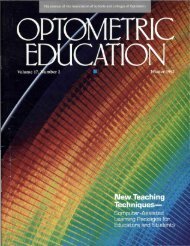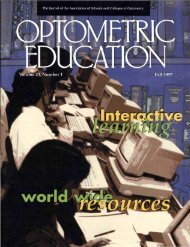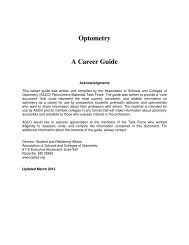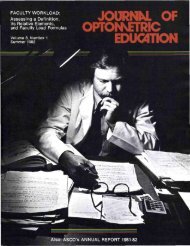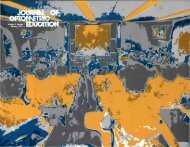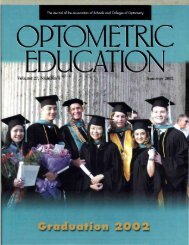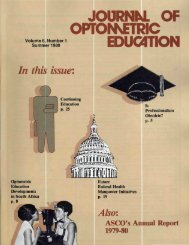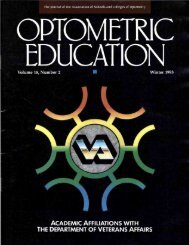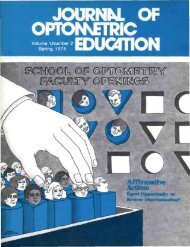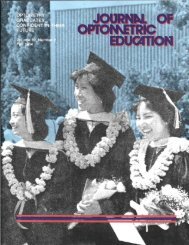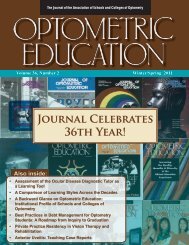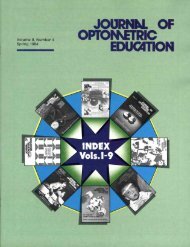Spring 1992, Volume 17, Number 3 - Association of Schools and ...
Spring 1992, Volume 17, Number 3 - Association of Schools and ...
Spring 1992, Volume 17, Number 3 - Association of Schools and ...
Create successful ePaper yourself
Turn your PDF publications into a flip-book with our unique Google optimized e-Paper software.
Toward an<br />
Ethical Community<br />
Henry H. Hayden, D.D.<br />
Mark Twain observed that man is<br />
the only animal that blushes...or needs<br />
to! As we perceive the current decline<br />
<strong>of</strong> ethical st<strong>and</strong>ards, there is much to<br />
blush about. In a recent interview,<br />
British commentator Alistair Cook<br />
stated: "America is engaged in a race<br />
between vitality <strong>and</strong> decadence, <strong>and</strong><br />
it appears that decadence is winning.<br />
Why? Conspicuous consumption,<br />
inordinate greed, shallowness, <strong>and</strong><br />
eccentricity in the arts — all signs (<strong>of</strong><br />
ethical decline) noted in Thomas<br />
Gibbon's Decline <strong>and</strong> Fall <strong>of</strong> the Roman<br />
Empire."<br />
The loss <strong>of</strong> ethical st<strong>and</strong>ards is <strong>of</strong>ten<br />
measured by the sc<strong>and</strong>als prevalent in<br />
the banking community. Harper's Index<br />
issued the following statistics: Amount<br />
stolen from banks by robbers in 1989<br />
— 50 million. Amount stolen by employee<br />
fraud <strong>and</strong> embezzlement in 1989<br />
— one billion.<br />
The decline in ethics is <strong>of</strong>ten attributed<br />
to the failure <strong>of</strong> the teaching pr<strong>of</strong>ession.<br />
As the famous Jewish theologian<br />
Abraham Heschel stated:<br />
"We prepare a pupil for employment<br />
<strong>and</strong> for holding a job. We do not teach<br />
him or her how to be a person, how<br />
to resist conformity, how to grow in-<br />
Dr. Hayden was pastoral minister <strong>and</strong> college chaplain<br />
at the University <strong>of</strong> New Hampshire <strong>and</strong> the<br />
University <strong>of</strong> New Mexico.<br />
wardly. We teach him or her to adjust<br />
to public opinion; we do not teach how<br />
to cultivate privacy, how to save the<br />
inner person from oblivion — this is<br />
the major challenge which we face."<br />
The decline in ethics is not only<br />
marked by dishonesty, deceit, <strong>and</strong><br />
fraud in the various pr<strong>of</strong>essions, but<br />
also by a general unwillingness <strong>of</strong> peo-<br />
Our purpose is to point<br />
a way to o recovery <strong>of</strong><br />
ethical st<strong>and</strong>ards . . .<br />
pie to sacrifice for the common good.<br />
The failure <strong>of</strong> "noblesse oblige" ('To<br />
whom much is given, much is required")<br />
is reflected in the Gallup<br />
report on charitable giving (Los Angeles<br />
Times 9/25/90): "In 1989, households<br />
with incomes under $10,000 gave 5.5%<br />
<strong>of</strong> their income to charity, while those<br />
with incomes from $50,000 — $60,000<br />
gave 1.7%, <strong>and</strong> those earning over<br />
$100,000 gave 2.9%."<br />
What we have cited is but a small<br />
sample <strong>of</strong> signs pointing to the ethical<br />
decline in society. Our purpose, however,<br />
is not merely to deplore but to<br />
point a way to a recovery <strong>of</strong> ethical<br />
st<strong>and</strong>ards, a recovery which would<br />
bring about a unified, healthy society<br />
in which public trust is restored.<br />
The roots <strong>of</strong> morality are found in<br />
the major living religions. We have<br />
traditionally looked to the Ten Comm<strong>and</strong>ments<br />
<strong>of</strong> the Hebrew heritage,<br />
<strong>and</strong> the New Testament teachings <strong>of</strong><br />
the Christian heritage as the main<br />
sources <strong>of</strong> our social <strong>and</strong> political<br />
morality. The radical secularization <strong>of</strong><br />
the 20th century, the tremendous<br />
growth <strong>of</strong> technology, the widespread<br />
migrations <strong>of</strong> peoples <strong>and</strong> cultures<br />
have created an intensely pluralistic<br />
society in which the individual feels<br />
powerless <strong>and</strong> isolated, <strong>and</strong> finds no<br />
unifying moral imperative coming from<br />
the leaders <strong>of</strong> the community. When<br />
individualism goes too far, it destroys<br />
the sense <strong>of</strong> the common good which<br />
binds a society together <strong>and</strong> underscores<br />
a sense <strong>of</strong> trust <strong>and</strong> mutual<br />
responsibility. This theme is spelled out<br />
in Robert Bellah's book Habits <strong>of</strong> the<br />
Heart. In his concluding chapter he<br />
writes:<br />
"Many <strong>of</strong> those with whom we<br />
talked were locked into a split between<br />
the public world <strong>of</strong> competitive striving<br />
<strong>and</strong> the private world <strong>of</strong> love <strong>and</strong> meaning<br />
that makes competitive life bearable.<br />
Some, however, were engaged in<br />
an effort to overcome this split, <strong>and</strong><br />
to make our public <strong>and</strong> private worlds<br />
mutually coherent — in a word, to recover<br />
our social ecology . . . these<br />
people are drawing on our republican<br />
<strong>and</strong> Biblical traditions, trying to make<br />
our second language into our first<br />
language again."<br />
Such an observation indicates the<br />
need for a recovery <strong>of</strong> our religious<br />
vision if we are to ensure our ethical<br />
health. By no means does this imply<br />
the imposition <strong>of</strong> morals from the top<br />
down by any single religious body<br />
such as we see in Islamic fundamentalism<br />
in Iran (or versions <strong>of</strong> it even<br />
in Christian fundamentalism in this<br />
country). Rather, we look for a growing<br />
consensus <strong>of</strong> religious- moral vision by<br />
the coming together <strong>of</strong> the major living<br />
religions in the realization <strong>of</strong> their<br />
common ethical heritage. While sectarianism<br />
may flourish, <strong>and</strong> modes <strong>of</strong><br />
worship differ, there is still a core <strong>of</strong><br />
74 Optometric Education



